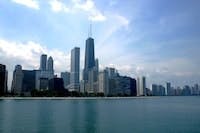The Metropolitan Water Reclamation District of Greater Chicago (MWRD) celebrated its 125th anniversary in 2014, but that was not the only significant occasion worth commemorating. The MWRD's 1.800.332.DUMP hotline was instituted in 1989, and thousands of calls have been received and investigated since the 24-hour hotline began operating 25 years ago.
The hotline was implemented when the MWRD recognized there continued to be violators to the Clean Water Act of 1972. Some companies, businesses and individuals who continued to dump toxic waste into area waterways and sewers rarely faced consequences or penalties. It was recognized that public input was needed to stop the violators.
"Whether a release to the waterways is deliberate or accidental, the hotline makes it easy for the public as well as our own staff to report instances of water pollution," said Commissioner Debra Shore, chairman of the MWRD's Public Information and Education Committee. "Callers can retain their anonymity if they wish. The important thing is that we are made aware of any possible contaminants in the waterways."
Over the past 25 years, public input has helped to save fish and wildlife while limiting damage to the biological processes that are a part of wastewater treatment facilities.
MWRD systems dispatchers monitor the hotline from a control room in Chicago. If a caller is reporting a dump or spill into a sewer or into a Chicago area waterway, the dispatcher refers the call to the MWRD's Industrial Waste Div. and a pollution control officer immediately launches an investigation. The officers strive to complete their investigation within five business days. Some cases may be open longer due to the nature of the event and the involvement of other agencies. Depending on the circumstances, services or assistance may be needed from the Illinois Department of Natural Resources, the Illinois Environmental Protection Agency, the U.S. Environmental Protection Agency or the U.S. Coast Guard.
The officers also investigate self-reported spills and discharges of pollutants and hazardous, toxic or volatile materials to sewer systems and waterways within the District's boundaries. The officers also may themselves initiate containment and cleanup activities pertaining to such events as they routinely survey industrial facilities and sample effluent discharges to determine their compliance with the Sewage and Waste Control Ordinance.
Calls that are unrelated to illegal dumping are transferred to the appropriate contact within the MWRD for follow-up action.
"Pollution control officers have greatly reduced occurrences of dumping and have worked hard to assure that chemical wastes are disposed of in an environmentally-responsible way and in compliance with federal, state and local laws," Shore said.
Source: MWRD


